Top 5 MCU Villains
“Marvel has a villain problem.” You’ve heard this countless times when discussing the Marvel Cinematic Universe, with plenty of examples pointing to the lack of quality heavies menacing the Avengers and their cohorts. Is it true? Well, yes and no. It isn’t Marvel so much as Hollywood itself that has a villain problem, with most recent bad guys existing for the sole purpose of allowing the hero to punch somebody during the climax. Think of your favorite action movies from the last ten or fifteen years; now think of the villains. Could you even remember who they were? This problem has bled into superhero cinema, where formerly larger-than-life supervillains have given way to bland, forgettable nobodies who are more often than not just cheap knockoffs of the hero they’re facing. To say this problem is unique to Marvel is to ignore the larger trend. (And, really, should DCEU fans be throwing stones in this regard?)
Any way you slice it, Marvel’s evil output is, overall, less than stellar. But that doesn’t mean there aren’t a few winners among the also-rans, and even a few truly great baddies. So, in honor of Thanos’ upcoming emergence in Avengers: Infinity War, here are my top five Marvel Cinematic Universe villains. For this list, I’m excluding the Netflix shows and focusing solely on the best MCU villains from the movies.
*Spoilers for the entire MCU up to this point*
Honorable Mentions: Emil Blonsky/Abomination has a great arc and compliments Bruce Banner quite well; Hela is fun and deliciously evil for the five minutes she’s actually in Thor: Ragnarok; Ultron is fascinating when pontificating about the nature of humanity, but never feels like a real threat; Alexander Pierce is a hoot for the casting alone, but he functions more as the face of a larger evil than as a full-fledged villain in himself; Obadiah Stane’s slow, almost scene-by-scene unveiling as the first big MCU antagonist is rewarded on multiple viewings, even if he doesn’t feel like a real heavyweight compared to some of the other bad guys in the Marvel rogues galley.
5. The Red Skull (Hugo Weaving), Captain America: The First Avenger
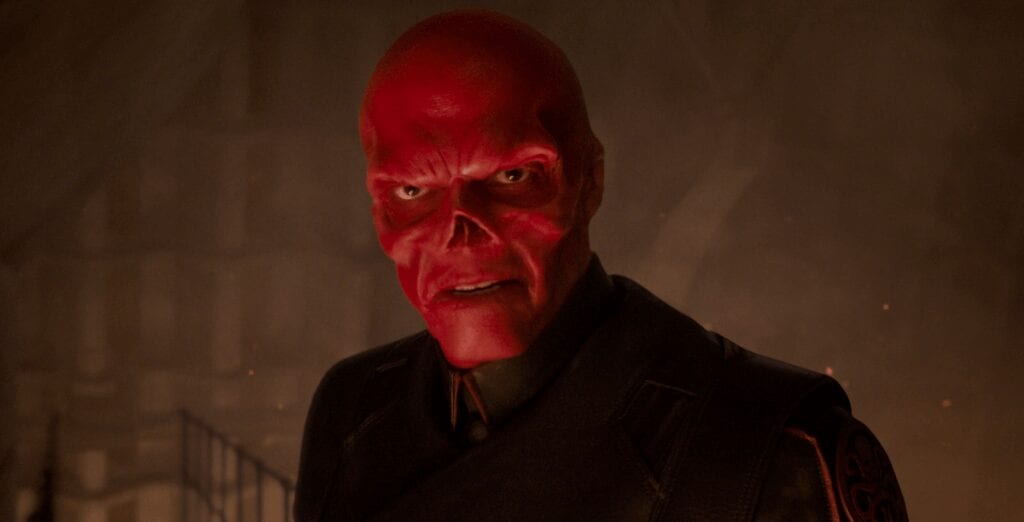
When you need to establish a villain’s wickedness in a short amount of time, go with a Nazi. It is a testament to the Third Reich’s symbolism as the worst of humanity that its imagery is still the most potent shorthand for evil we’ve got (despite modern attempts to dilute it). Would we be as invested in Indiana Jones’ desperate scramble to recover the Ark of the Covenant if his failure didn’t mean it falling into Hitler’s hands? Would we fear going to the dentist quite as much if behind Christian Szell’s torture there wasn’t a black heart branded with a Swastika? Captain America director Joe Johnston himself crafted another pulpy tale depicting Nazi infiltration of American society with 1991’s The Rocketeer. The Red Skull does them all one better, though: he is a villain too evil for the Nazis.
Fairly early in the film, Red Skull declares that Hydra, his division of the Reich, can “grow no further in Hitler’s shadow” after dispatching three high-ranking Nazis with his Tesseract-powered ray gun. As bad as humanity’s ultimate evil is, the erstwhile Johann Schmidt is worse, in essence the purest form of the fascistic brand of evil – a counter to Captain America’s perfect distillation of the American spirit of freedom. He proves his ruthlessness whenever he’s on screen, be it by ordering the liquidation of an entire town, experimenting on captured soldiers, or executing an underling for the crime of surviving a battle with Cap and the Howling Commandos. When in battle himself, he is easily a match for Steve Rogers, trading blows with the man who makes mincemeat of his armies without breaking a sweat – the dent he puts in Cap’s first shield is indicative of the star-spangled hero finally meeting his match, and the constant struggle freedom must endure to hold back the rising tide of tyranny. Hugo Weaving, already movie villain royalty for playing Agent Smith in The Matrix, captures the vanity (“Not a scratch, doctor; not a scratch.”), the physicality and the ruthlessness of Captain America’s classic nemesis perfectly, crafting a villain whose fairly short screen time (though not relative to some of his MCU brethren) is lamentable.
In divorcing himself from the Nazis, the Red Skull becomes almost a catch-all of evil representation. While still retaining the stigma of his National Socialist origins, he can be seen as an early proponent of globalism, insisting “I have seen the future, Captain! There are no flags!” as he prepares the destruction of several world nations, including his own, while wearing a circular symbol devoid of nationalism. In his zeal to recover the Tesseract and wield “the power of the gods” as the means of his conquest, he is a handy stand-in for religious fanaticism and terror as well. As such, he is the embodiment of the shifting nature of evil, from the power-hungry nation-state to the more diffuse ideologies that plague the world today. When he returns (and he will return; I am convinced he was simply transported to another realm by what we now know is the Space Gem and will be deposited back on movie screens at some point – perhaps in a post-credits scene at the end of whatever the next Avengers movie ends up being called), it will be intriguing to see what kind of threat he will represent.
4. Ego the Living Planet (Kurt Russell), Guardians of the Galaxy Vol. 2
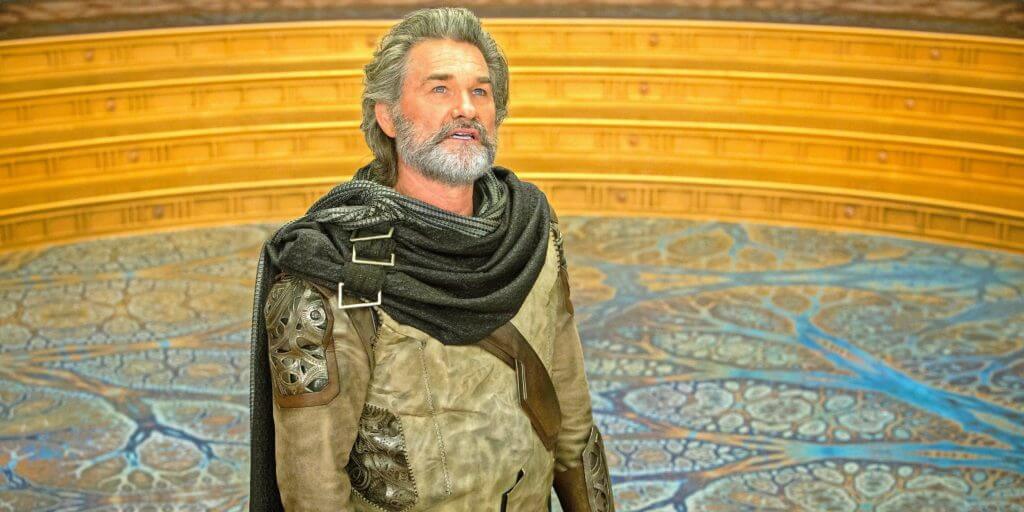
Hollywood has a history of bad dad bad guys, from Darth Vader to Jack Torrance, and Ego the Living Planet masterfully upholds that tradition. His evil nature isn’t revealed until late in the movie, so for the first three quarters of Guardians of the Galaxy Vol. 2 he seems like the cool dad we all wished we had in our weaker childhood moments when we couldn’t appreciate our own. Peter Quill never knew his father and fantasized about pop culture icons filling the role; then he finds out his real dad is a space-faring ladies’ man with godlike power played by Kurt Russell; what’s more, his father seems to balance the rock star persona Peter always envisioned with the everyday dad things a kid wants, like playing catch and helping him realize his full potential. Ego is his childhood dream come true.
But that dream masks a nightmare, because Ego lives up to his name: he’s a power-hungry deity who wants to claim every planet in the universe as a part of himself, literally remaking existence in his image, and his son is just a means of achieving that. This is the pitfall of the cool dad; they’re selfish, narcissistic and cold towards the ones who love them. Any game of catch will be a one-and-done, any story an embellishment designed to enhance their manufactured legend, any fatherly guidance vested in self-interest. The good dads are the boring ones who are there every day to teach us the mundane things that prepare us for life, who sacrificed their cool personas for us, the ones we take for granted until it’s too late – the Yondus, in short. The Egos always turn out to be monsters.
When it comes to his vast power, though, monster doesn’t quite cover it; Ego is a Lovecraftian demon god, so massive in scope he doesn’t even consider human life as a factor in his aspirations. When he tells Peter how he gave his mother the cancer that took her life, it doesn’t occur to him that this could be his fatal error because some random woman on some dusty planet is too insignificant to matter to him, and he can’t understand how she could matter to his son either. For all his power and knowledge of the universe and its workings, Ego doesn’t understand people, and that proves to be his ultimate undoing. Kurt Russell is just right as the fun-loving, affable dad Ego first appears to be, and handles the eventual turn to darkness with aplomb.
3. Erik Stevens/Killmonger (Michael B. Jordan), Black Panther
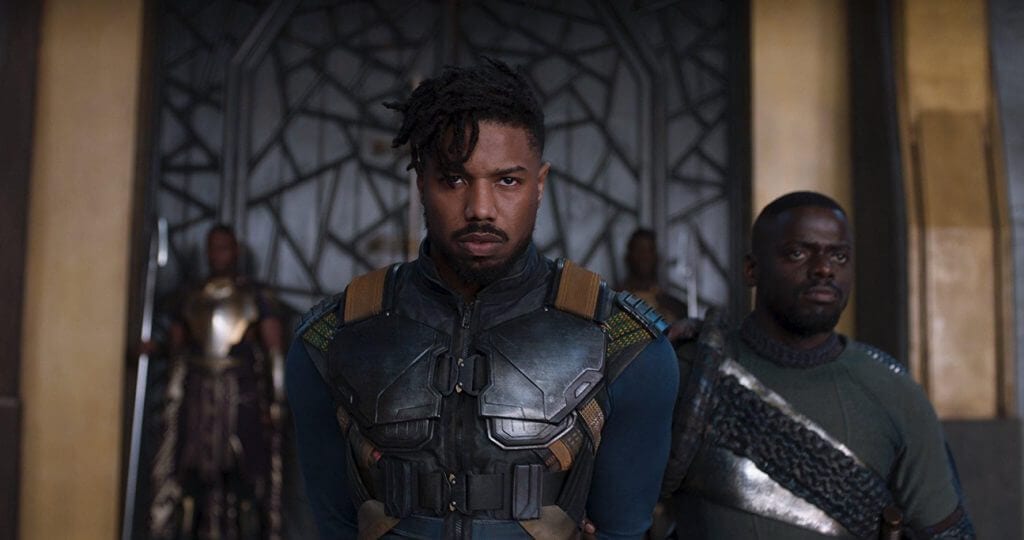
Erik Stevens is introduced to the audience without us knowing it, as a scared little boy about to discover that he’s lost everything. For the rest of his life, through the violence and evil he commits as Killmonger, he will forever remain that same boy, left alone in a harsh world, struggling to survive. In this way, he’s very much a mirror image to Steve Rogers, still a goodhearted “kid from Brooklyn” despite becoming a super soldier. But while Rogers has a country to proudly call his own, Erik has none, and is searching for a national identity. During the museum heist – as well as in his dying words at the end – we learn he rejects Western civilization as the land of colonial oppressors. All that’s left for him is the birthright denied him by his uncle T’Chaka: Wakanda.
In his conquest of Wakanda, Killmonger is the personification of one of Black Panther’s major themes – the disconnect between African culture and African-American culture. He was rejected by Wakanda, not allowed into an advanced society where he would’ve prospered, for fear he would have corrupted it, take away just a little bit of what makes Wakanda special by his mere presence. The result was an abandoned child who grew up to become a monster. But the other side of the coin is that, when he finally does get what he wants, Erik shows a deep misunderstanding – as well as a severe disinterest in trying to understand – Wakandan culture. He burns the herbal resource that gives a Black Panther his power (after consuming it himself, of course), and he fundamentally changes the isolationist policy in order to start a worldwide insurrection so his adopted culture can reign supreme. He is destroying the nation’s culture and replacing it with one incompatible with Wakanda. So, while T’Chaka’s prediction came true, it could have been avoided had he shown a shred of humanity to a child who needed help. Inasmuch, by simply existing, Killmonger is T’Challa’s harsh lesson learned. He is the tragic result of his father’s cold-hearted isolationism and the greatest fear of those who wish to keep Wakandan culture pure. To combat this, T’Challa keeps Wakanda for Wakandans but exports its wealth, technology and resources to the rest of the world, both preventing future Killmongers from being born and keeping the ones who already exist from taking his land from him and his people.
Separated from the heavy subtext, Killmonger is fun. He has a wicked sense of humor, reveling in the trouble he causes and throwing his irreverence in the faces of those who prospered while he suffered. He’s a bad guy with a good point (often the most dangerous villains of all, making you uncomfortably nod along as they go about their evil ways), and his conviction in his righteousness is played with a lighthearted flair by Michael B. Jordan, the second disgraced Human Torch redeemed by Kevin Feige and his team. And when the action starts, he convincingly poses a physical threat to T’Challa, feeling like the unstoppable force he is. Much like T’Challa, we can’t completely love or hate Killmonger, and that makes him equal parts entertaining and unsettling.
2. Adrian Toomes/the Vulture (Michael Keaton), Spider-Man: Homecoming
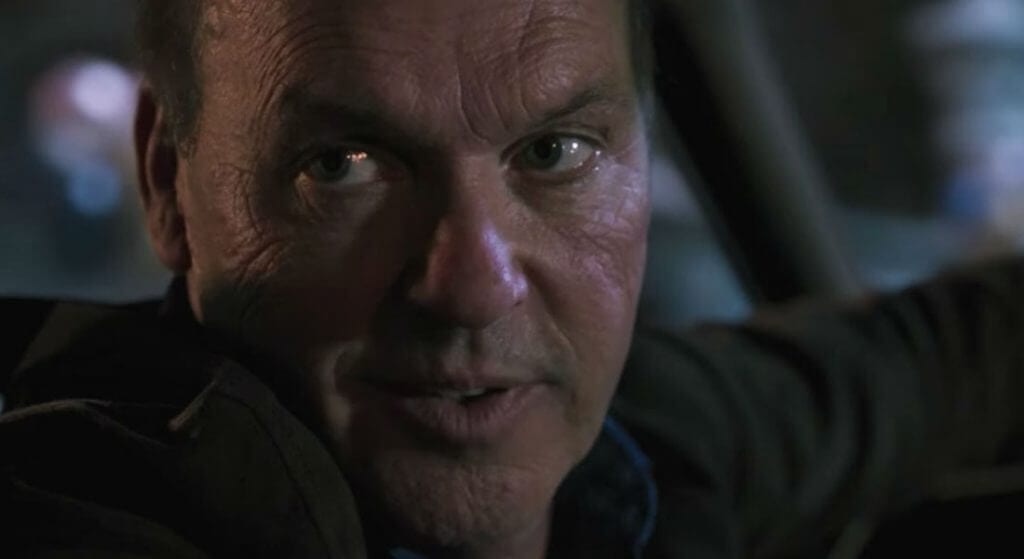
Sensing a pattern here? Marvel really stepped up its villain game over the last year (hopefully indicating great things to come from a certain death-obsessed Mad Titan), and the best of this great roster is a blue collar guy trying to provide for his family. The very basics of the American dream are really all Toomes wants, and in the opening scene of Spider-Man: Homecoming he’s on his way to achieving his modest goal. He’s got a big city contract for his salvage company to clean up the mess left in the wake of the Battle of New York, but before he can even put food in his fridge, the job is snatched away from him… by Tony Stark. A bunch of government thugs, in conjunction with the richest man in the world (who, by the way, caused all the damage in the first place), force him off the site and back to a life of wondering where his next pay check will come from. Is it really any wonder he turns to crime?
Keeping some of the Chitauri tech from the battle zone that was once Midtown Manhattan, Toomes and his employees go into business for themselves, making weapons from their smuggled bounty and selling them on the black market. All the while, his purpose is the same: do right by his family. But crime changes a man, and as he delves deeper and deeper into the depths of lawlessness, Toomes grows more comfortable with the less savory aspects of his secret profession. It starts with his accidental killing of Jackson Bryce, the first Shocker, escalates to his violent confrontations with Spider-Man, and culminates in him pulling a gun on a high school kid and threatening, “I’ll kill you, and everyone you love.” At the same time, Toomes’ hatred of Tony Stark and everything he believes the billionaire stands for – the rich taking what they want while the little people struggle – causes him to become more and more like Stark, from starting his own business to developing a costume and weapons to facilitate its operations. (It’s no accident that Toomes exiting his Vulture suit is virtually identical to Stark removing the Iron Man armor.) In thumbing his nose at the establishment, Toomes becomes that which he hates most.
And yet, Toomes is still, at least partly, the same dedicated father he started out as. When he makes a fuss over daughter Liz on Homecoming night, he is absolutely genuine in his love and adoration of her. His friendliness with Peter is also real; aside from being an arms-dealing supervillain, he’s a heck of a nice guy. That this sequence ends in his scariest moment is the summation of his arc; Adrian Toomes will do horrific violence to protect his family. In this way, Toomes is all of us, the people who will struggle and scrape and do things of which we never thought ourselves capable to make sure those we love are taken care of. As Spider-Man is the everyman hero, so is the Vulture the everyman villain, and as such the perfect one to introduce Peter Parker to the Marvel Cinematic Universe. That he is played by the great Michael Keaton – selling the pain, the drive and the menace of Adrian Toomes equally well – is just a bonus.
1. Loki (Tom Hiddleston), Thor, The Avengers, Thor: The Dark World, Thor: Ragnarok
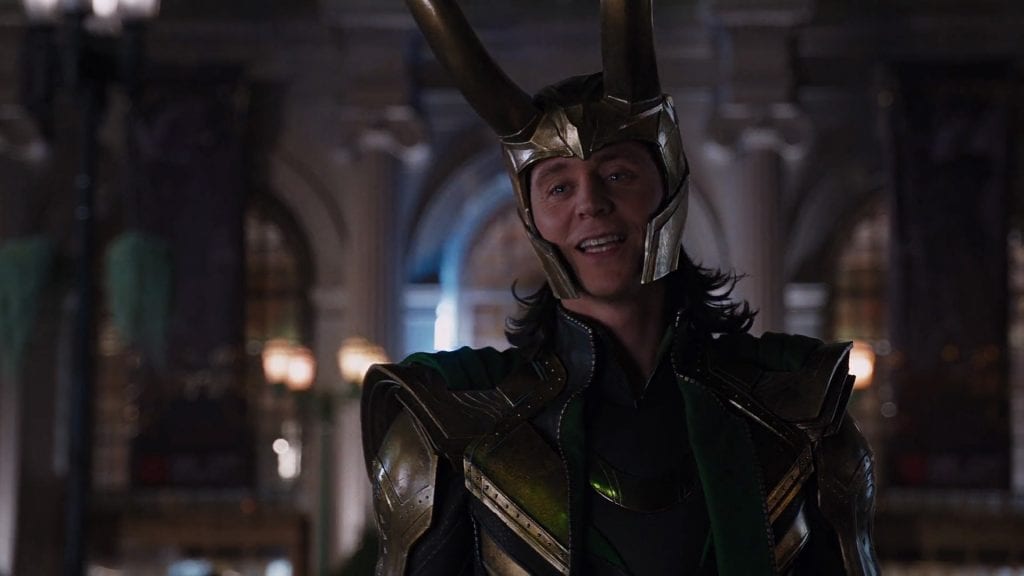
Could it have been anyone else? Sometimes the safe choice is safe for a reason; through even the darkest days of MCU villainy, the Whiplashes and the Yellowjackets and the Ronans the Accusers, once we were introduced to – and promised more of – the God of Mischief it was all worth it. Loki embodies the very best traits of everyone listed above, and is a knave so special he elevates the entire evil pantheon of his cinematic universe and cannot be undone even by an appearance as embarrassing as that in Thor: Ragnarok (and let us not speak of that unpleasantness again). Throughout his first three movies, Loki is treated not just as an antagonist, but as a central character in his own right, embarking on a multi-film arc with just as much weight as those of the heroes. And he has a lot of fun doing it.
As with several of the other MCU entries, for much of its runtime Thor keeps its villain a secret to anyone who doesn’t know the comics (or Norse Mythology), presenting Loki simply as Thor’s more level-headed brother, tagging along on the Thunder God’s ill-advised ventures to protect him as best he can. When Odin casts Thor out of Asgard to live as a mortal in our realm, Loki argues in his favor. When he induces the Odinsleep in his father, he shows genuine remorse for his prodding tantrum. But it’s all a lie; Loki is the Iago of the Shakespearean tragedy at the heart of Thor’s story, telling everyone exactly what they need to hear to fulfil whatever purpose for which he’s slotted them – including the evil Frost Giants of Jotunheim, his biological kin. And when he’s done with them, Loki kills anyone no longer needed, all with the intention of winning the Asgardian throne. But beneath his evil and lust for power is, as with the Vulture, the most human of motives: Loki wants to prove himself to the father who always favored his lunkheaded brother. The tragedy (which, of course, he brings on himself) is that, in doing so, he proves himself unworthy of the position he covets.
The Avengers features a very different Loki, one angry at his defeat and looking for revenge on the family he believes wronged him. He makes a pact with the devil to deliver one of the keys for ruling – or destroying – the universe, just so he can take his brother’s new toy away as payback for being Daddy’s favorite. (“So you take the world I love as recompense for your imagined slights?”) A world is at risk, an invasion is triggered, countless lives are lost, all because of a jealous prince. But through his mission of conquest, Loki’s prejudices are revealed; he is in love with being a god, and like Ego he sees humans as so insignificant that any right to autonomy is a ludicrous notion. (“An ant has no quarrel with a boot.”) In this, the figure of an older religion becomes the embodiment of criticisms of newer ones. Consider: a god descends from the heavens, assuring the mortals who encounter him that he comes “with glad tidings;” tells them that the only true freedom they will find is in obedience to him, that people are in fact “made to be ruled,” and that only those who accept this truth “in [their] heart” will “know peace;” turns those who do accept into mind-controlled zealots; he uses misogyny as a weapon (“This is my bargain, you mewling quim!”); he seeks to manipulate science as a means of his rule (“You brought the monster.”); and he is ultimately defeated by that very same science, against which he is, for all his declarations of godhood, powerless. The imagery of Nazi Germany (shades of the Red Skull) is more on the nose; the point being that whatever you see as the oppressive force seeking to enslave mankind, that is what Loki embodies. In terms of the individual Avengers, he is each of their counterpoints; the fascism to Captain America’s freedom; the only being in the universe as full of himself as Tony Stark; the loss of control Bruce Banner fears more than anything; the potential for Asgardian destruction Thor has sworn to keep from Midgard; the irredeemability Natasha wonders is her lot in life; the corruptibility from which Hawkeye rescued Natasha now forced on him. In defeating Loki, the Avengers are each conquering their doubts about themselves and their ability to be the heroes we need them to be.
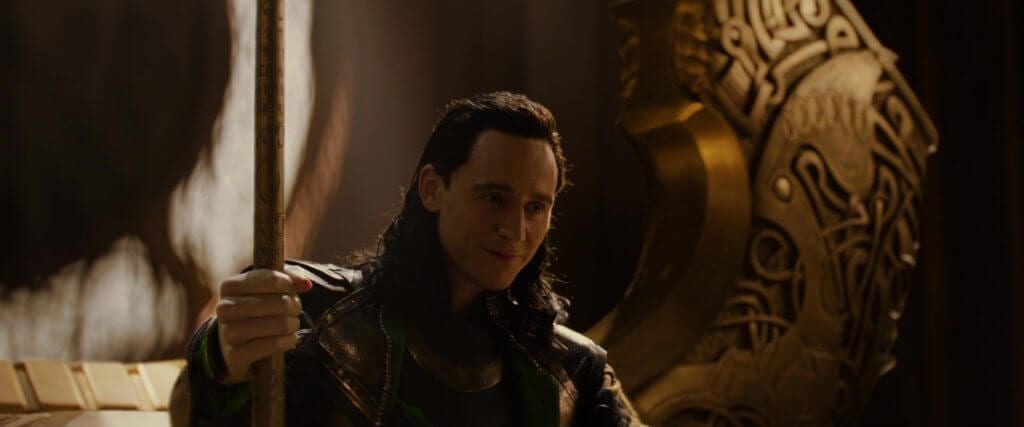
Thor: The Dark World once again casts Loki in a different light; now, in chains, he is the petulant child ranting about how much he hates his father as he’s punished for his misdeeds. But through his anger, we see still more humanity from the Trickster God as we experience his love for his mother Frigga. Their one scene together, in which Loki is wounded by the idea that Frigga would think he doesn’t consider her his mother, reveals so much about him; we get the impression that, while athletic warrior Thor was Odin’s favored son, the more cerebral Loki was a mama’s boy, learning at her feet the illusionary magic that is his stock in trade (the same magic The Dark World establishes Frigga as using). When Frigga dies, it is because Loki directed her killer right to her, and his anger and pain is multiplied by his knowledge that the only person he loved completely is another casualty of his grudge against his father and brother. Loki is then given a chance at redemption, and he seems to take it, avenging his mother and even laying down his own life to save the brother he can’t bring himself to forgive. But, as always, nothing Loki does can be taken at face value, and in a Machiavellian twist, he uses his feigned sacrifice, the threat of a destroyed universe, even his beloved mother’s death, as a means of finally winning the throne he’s coveted from the beginning, the prize for which he’s fought, bled, killed and sacrificed everything and everyone he loves – and who loves him – to attain.
Like Killmonger, Loki is just plain fun through all of this. He has some of the MCU’s most quotable lines, and he lives up to his God of Mischief moniker, taking true joy in the evil he foments. But undercutting all of this is a palpable menace, the understanding that Loki has both the means and the will to cause real harm. The scene between him and Tony Stark in The Avengers is one for the ages, and what makes it so thrilling is that, amid the jokes and the preening and the Scotch, is the understanding that Loki could eviscerate Tony any time he wants; Tony’s bluster is a desperate stall tactic while Jarvis readies his new armor and he hopes against hope that Loki doesn’t get bored with him too quickly. All the credit in the world must go to Tom Hiddleston, a relative unknown when cast in the role who stands taller than some of the cinema giants who’ve tested the mettle of Marvel’s heroes, in embodying a character as complex as Loki and hitting every single note, every single time. I can’t wait to see what he gets up to in Infinity War.
***
And I can’t wait to see if the mastermind behind the evil goings on in the MCU manages to eclipse him either. Thanos has a lot to live up to with Loki alone, let alone the other best MCU villains, and if he isn’t great, the whole movie will fall apart. But here’s the rub: Marvel knows this. They understand they absolutely have to nail Thanos, and no “we prefer to concentrate on our heroes” excuses will get them out of it. Call me a dreamer, but I think we’re in for something special.







